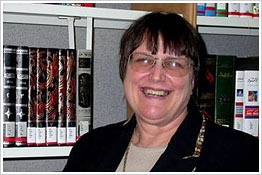Congestion Healed
Daphne Selbert climbed into the back of a taxi during Ramadan, she had no idea the driver would give her just the attitude adjustment she was looking for.
By Daphne Selbert, UT
Categories: Gratitude, Guidance, Health Ramadan in the Middle East is a month devoted to fasting, good works, and spiritual study. The work day is cut back to six hours, and all public restaurants are closed during the day. One would think that the shorter hours would give one the luxury of tranquility and personal study. That is certainly the intent.
 It was not that way for me one Ramadan. Ramadan was a time of challenge—a time of congestion. For six weeks or so (even before Ramadan), I was challenged by a series of head and chest colds. I would think I was getting better and then find myself more uncomfortable than before. I was told that feeling this way was the result of the heat and cold adjustments on the university campus where I worked. The air conditioning was being adjusted, and the temperature variations were dramatic. In my office, it was often in the low 60°s, and I taught in classrooms that had no air conditioning at all -- with temperatures in the 90°s, which was what it was outside. It was not that way for me one Ramadan. Ramadan was a time of challenge—a time of congestion. For six weeks or so (even before Ramadan), I was challenged by a series of head and chest colds. I would think I was getting better and then find myself more uncomfortable than before. I was told that feeling this way was the result of the heat and cold adjustments on the university campus where I worked. The air conditioning was being adjusted, and the temperature variations were dramatic. In my office, it was often in the low 60°s, and I taught in classrooms that had no air conditioning at all -- with temperatures in the 90°s, which was what it was outside.
My days, far from being tranquil, were heavily scheduled, as we had to fit eight hours of work into six hours. I found that there were more than a few days when any break for food or water just did not fit into the schedule. I quipped that they were scheduling us into a mandatory fast. I was working entire weekend days to prepare for teaching during the week. If Ramadan was a time for spiritual reflection, I found myself fitting in my daily personal Bible study infrequently, if at all.
On Monday of this week, I had to go to work at 7:00 and worked until 5:30 in the evening. I rode home with the Dean and got off at her apartment to catch a taxi the rest of the way home. I was "kicking against the prick" of Ramadan. I needed an "attitude adjustment," and I knew it. I found myself at the moment of Iftar (the end of the fast) trying to flag down a taxi, which is almost impossible. One is even told not to be on the road. The thought crept in, "This is NOT when you are supposed to be in traffic. You won't get a ride home. It is a 45 minute walk from here." I adjusted my attitude. I decided that if Diafah (the name of this street) meant "guest," I could expect to be treated like one. A taxi appeared immediately.
The short ride home turned out to be a lovely lesson in Ramadan. The driver was eating an orange and apologized. I assured him I was just grateful he had stopped at the moment of Iftar.
"I was so thirsty," he said, "I had to have fruit."
"Do you fast every day?" I asked the tall Sudanese.
"Of course. It is required under Islam."
"I can understand the sacrifice of food during the day, " I said, "but to be without water in this heat must be terrible. Why do you think it is required?"
"One must love one's neighbor," he told me. "And to understand your neighbor who is poor, one must know how to suffer as do the poor. Most of us are very blessed. Few of us know what it is to suffer or to be hungry. During Ramadan, we have a small sense of that. We fast the whole day. We read the Qu'ran and memorize verses. We study the spirit of the Qur'an and the words of Allah. We find ourselves more generous and more caring of our neighbors. And this is worth the sacrifice. To reach out to the poor is a pillar of Islam. Ramadan gives me pause to appreciate the good I have always, and to understand the good that is not there for others. It helps me to help my neighbor."
It was a five-minute drive from Diafah, the street of the guest, to my apartment. I felt humbly blessed. I gave him DHS 15 for the 9.50 ride. "Oh, miss," he said, "It is only DHS 9.50." I replied, "You gave me the honor of a ride as you broke your fast. This is a small appreciation of your special gift." He smiled and drove off to prayer.
Emerging from the taxi, I realized that I could breathe normally through my nose. I felt free. I was healed. I realized with clarity that I had allowed my LIFE to be congested. Weaving in a jumbled schedule, a resentment of Ramadan (or Ramadan's impact on my comfortable life), I had neglected my own spiritual study in the process.
I was grateful for the encounter with the spirituality of the Sudanese taxi driver and for the directional signs it gave me for the attitude adjustment. I was grateful that spirituality and spiritual thinking are universal—and for the lessons we can learn from others. I am grateful for the instantaneous healing that will act as a beacon in my own spiritual study. |